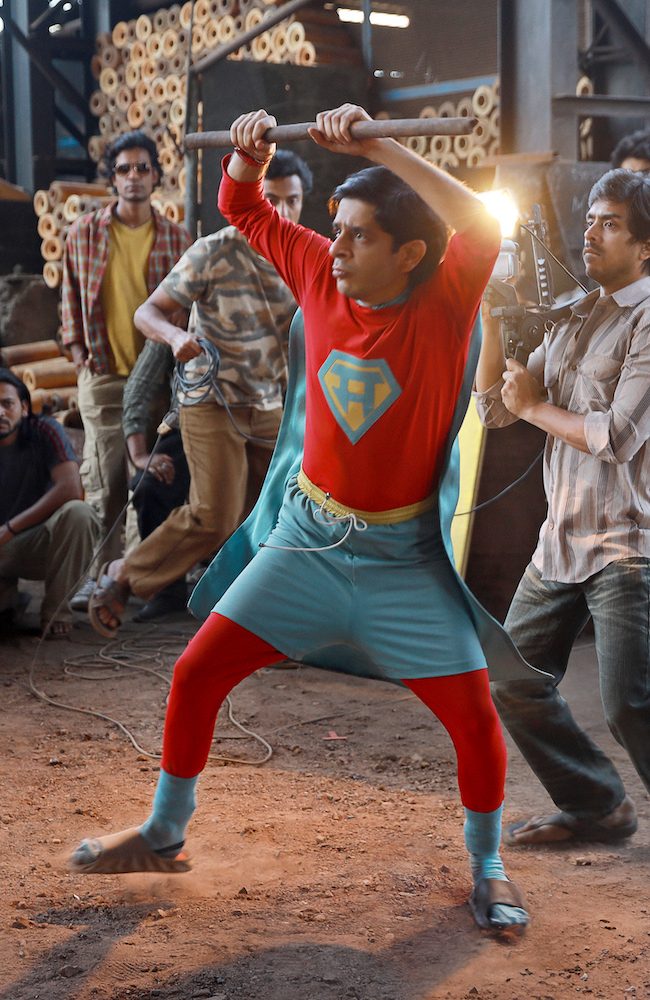A Conversation with Atom Egoyan (GUEST OF HONOUR)
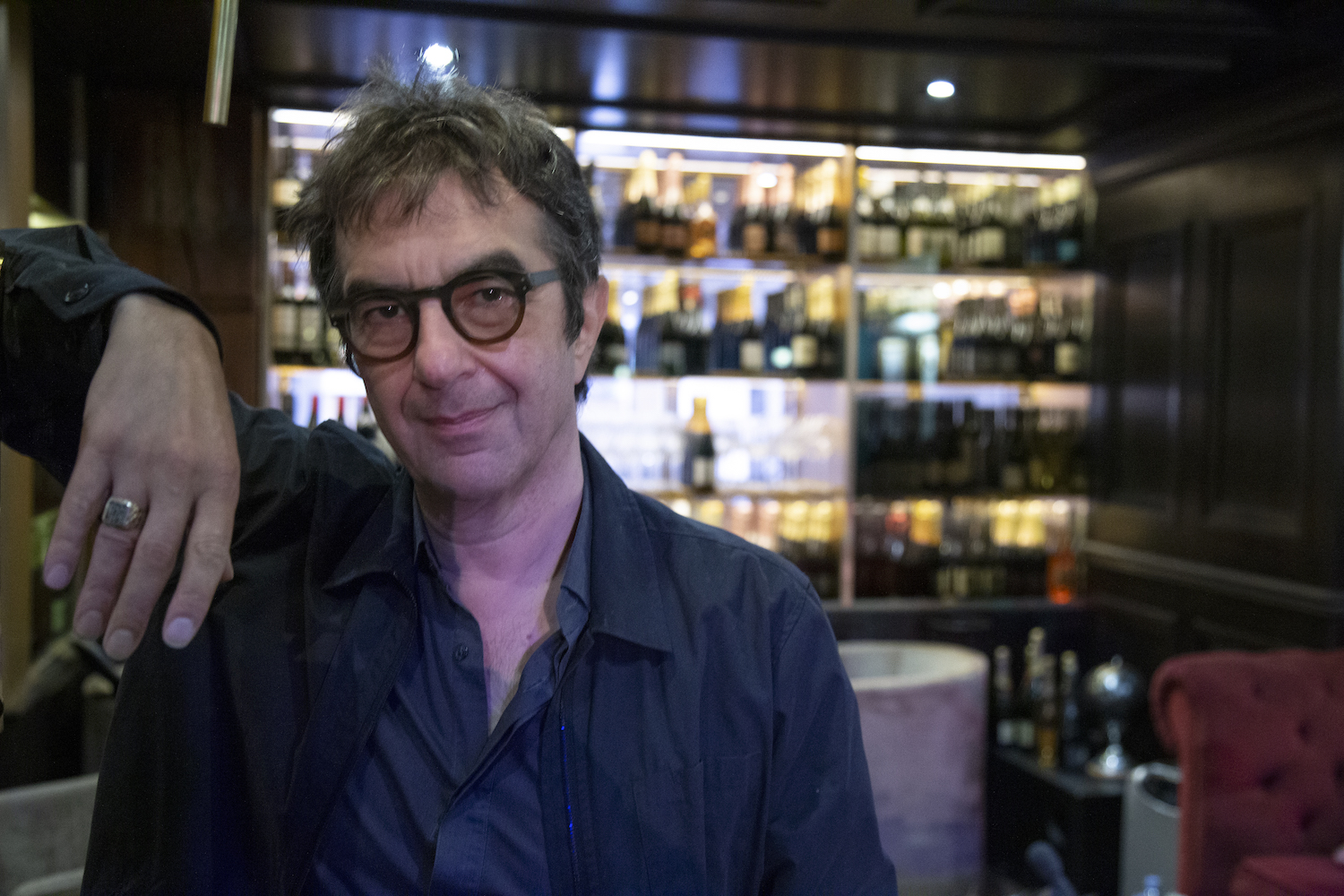
I met with Canadian director Atom Egoyan (Devil’s Knot) on Monday, September 9, 2019, at the 2019 Toronto International Film Festival, to discuss Guest of Honour (which I also reviewed), his newest feature. In it, he explores the fraught relationship between a father and daughter in the long aftermath of the death of their wife/mother. As in so much of the director’s œuvre, a past tragedy overshadows the present. Actors David Thewlis (Regression) and Laysla De Oliveira (Lea to the Rescue) beautifully incarnate the damaged souls at the center of the narrative, with Luke Wilson (Middle Men) joining them as a priest to whom the daughter confides her story. Moving and devastating, Guest of Honour continues Egoyan’s long tradition of cinematic excellence. Here is a condensed digest of our conversation, edited for length and clarity.
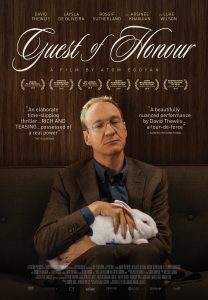 Hammer to Nail: So, in your body of work, you time and again explore the enduring legacy of trauma and grief. I’m curious what draws you, over and over, to these subjects?
Hammer to Nail: So, in your body of work, you time and again explore the enduring legacy of trauma and grief. I’m curious what draws you, over and over, to these subjects?
Atom Egoyan: Well, I think that in both those realms you have notions of responsibility and usually there is some burden of guilt, whether those are observed in a family, trauma within a family, trauma within a community, trauma within a whole population. There’s always some sense of responsibility, and I think I’m interested in ways people form a sense of personal narrative and that’s…there are really two impulses I’ve always observed in making a personal narrative ring true.
One is connecting dots, which is a positive side. But another one, which is just as prevalent, I think, is the notion of avoiding responsibility, avoiding guilt. Those are really strong feelings. No one wants to be blamed for something, so that dance figures prominently in a lot of the films. Obviously, it’s coming from things I’ve observed, and I am Armenian so that accounts for one notion of what reckoning might mean and what trauma might mean. But there’s lots of other issues that have floated and inspired me, and haunted me.
HtN: Well, “haunting” is a good word to associate with your cinema, as well. I’m going back to the films of yours I admire so much from the 1990s, such as Exotica, one of my favorite films…
AE: Thank you.
HtN: …and The Sweet Hereafter. I mean, in both, you have haunted protagonists.
AE: And haunted by things that have not been resolved, and also, they are very different characters, like the people themselves. I think that what inspires me are these portraits of these individuals. So, Jim Davis in Guest of Honour is a very different character than Francis Brown in Exotica or Mitchell Stevens in The Sweet Hereafter. They have different ways of understanding their own responsibility and culpability. And sometimes that’s been misplaced and they’ve been unnecessarily made to feel responsible for something that they haven’t done. And so they’re complex emotions and so you have to think of characters and find actors, of course, who are able to observe and detail all of that.
HtN: Another parallel is in Jim Davis – the David Thewlis character – going to places, visiting and evaluating and passing judgment, somewhat like the Elias Koteas character in another early film of yours, The Adjuster.
AE: I opened a bar a few years ago – it’s closed now – called Camera. It had a cinema, and I was really involved with setting it up. The food inspector was just fascinating to me. The person came in, and I just realized how much power they wield and in this country they can literally close a place down on the spot. Actually, this film in some ways, was inspired by an article in The New York Times I read about 10 years ago about a very beloved French brasserie that was closed, and the owner was just bereft. He went into a deep depression, didn’t want to reopen it, and he felt that his whole reputation had been lost. So Jim, yes, he falls in the line of insurance adjusters or tax auditors or customs agents, various people who have access to your life. I don’t know if any of them have such an oddball job as this one seems to be.
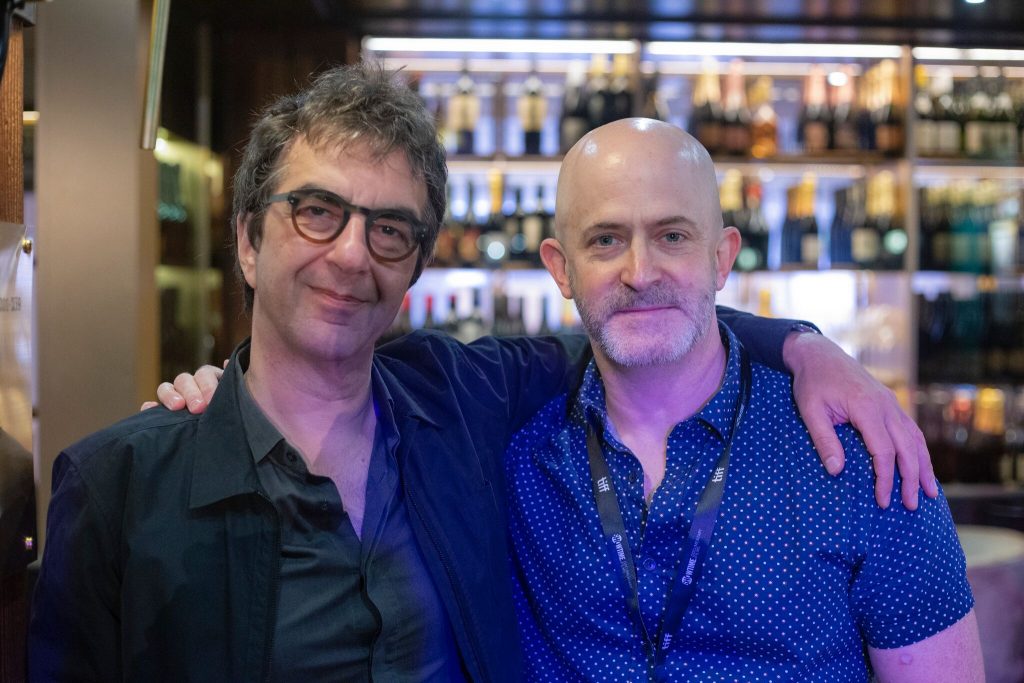
Filmmaker Atom Egoyan and Lead Critic Chris Reed
HtN: Another thing that I find interesting that I’ve seen recur in your films, as well, is the cutting back and forth between different timelines as a narrative device. What draws you to that, as well? Because it’s very much a part of your storytelling here, as it is in other films.
AE: Well, it’s really in the writing. People wonder whether or not the film exists in a more linear form, but it’s always conceived that way. That doesn’t necessarily mean that the lines are where they are in the final version. During the editing, that becomes a form of continuing the writing process in a way. But when you’re dealing with, in this case, like five distinct time periods, and they’re running in tandem with each other in these characters’ minds…because that’s really what I’m trying to do is find a way of accessing how these people are experiencing the world…what it is that is running through their minds is also running through the viewer’s mind at the same time. So it just seems organic to me.
I think that what I’m pleased about with this particular film is that, even though there are the five periods, you pretty much know where you are at all the times. I think sometimes viewers get confused, and I certainly understand the challenges of telling the story that way, but I just believe that you can go deeper into a particular aspect of what these characters are experiencing. I mean, I think linear stories are also really powerful. Some of my favorite films are linear stories. And actually, I made a film before this where I was dealing with trauma of a different type, called Remember, which was completely linear, that didn’t use multiple timelines.
HtN: So, how did you land on David Thewlis as your lead actor? I think he’s marvelous here. He so often is, but he works really well here.
AE: I had this idea that Jim should be from somewhere else and I liked this idea that all the characters in the film seemed to be from somewhere else and they’re carrying cultural histories and traditions as well as everything else. So, then I began to think about…I was raised on the West coast of Canada and there was a really strong ex-pat British community, and I remember some of these characters that I grew up with. I was also obviously from somewhere else. And you see a performance sometimes that you just can never forget. I remember seeing David Thewlis in Mike Leigh’s Naked
HtN: It’s so funny that you say that because I have a question directly related to Mike Leigh and Naked, but please, go on.
AE: That film really had a huge impression on me. I would say that that character probably had a lot to do with the character played by Elias Koteas in Exotica, who feels a lot like the David Thewlis character in Naked, in some ways. So obviously I had seen him in other roles, but I just felt that he was someone that the viewer would not put a lot of baggage onto because he hasn’t had a lot of lead roles, but he’s an extraordinary actor, and I just knew that he could find the right tone of humor to the piece as well.
HtN: The reason why I was thinking of Naked is because of your restaurant celebration scene here that made me, as a viewer, so uncomfortable. I’m always uncomfortable with embarrassing things that happen to protagonists in every movie I watch. I just have trouble, and I so empathize with the experience they’re going through. So, watching him in that drunken speech, it made me think back to all the things he does in Naked where he really is so emotionally, well, naked and that’s why I thought … I wrote a note as I was watching the film that this is the perfect actor for this role in Guest of Honour.
AE: Actually one of the most painful things, and I understood why I made the decision, but there’s a 10 minute take of that where he … it’s a brilliant reading, and my temptation was just to hold on him for 10 minutes and not come back.
HtN: I would have just fallen apart in the theater.
AE: Yes, I think people would fall apart because he holds it, but it’s excruciating, I suppose, to watch. My editor literally had to tear that idea off me because I was holding onto it because I felt that that was just so rare.
HtN: And again, he’s clearly an actor who whatever he’s feeling internally in those moments, he is comfortable doing that. I admire that, but I do find it excruciating to watch. So, how about your female lead, with whom I was not familiar, Laysla De Oliveira?
AE: You wouldn’t be. This is, I think, one of her first major roles. There was a casting process. I met her and I loved how available she seemed. First of all, in terms of the story, there had to be a certain energy she had. But I also just love the fact that she was so emotionally accessible at one level because I knew that there would be these different phases that we’d see her in. I think she does a very good job. When she’s in prison for reasons that we won’t get into, she is a very different person than when she is on this band trip, and then after her father’s passing when she’s with Luke Wilson, this priest. So I wanted, in these chronologies and different time periods, to see a shifting sense of who she is and try to reconcile what those different versions of her add up to.
HtN: What’s interesting is her face is so severe when we first meet her, when she goes to the church to meet Luke Wilson, the priest. Then, when we cut to earlier, when she’s a happy-go-lucky bandleader, I was quite struck by the sudden lightness in her performance, which I did not expect given how severe and withdrawn she is in the opening.
AE: So, those contrasts are really, I think, what drew me to her. There’s something that’s very easy with her, to find those different colors. And of course, we auditioned and explored that. And even when she’s quite severe, you’re drawn to the emotionality of it. She doesn’t feel cold. I wanted someone who felt that there was a lot of humanity in her.
HtN: So, did you work backwards from casting her to making her mother Brazilian?
AE: Yes, because there were a number of different ways that she could have gone. But then once we decided on that, it tied into the whole idea of all these ethnic restaurants and the fact that we find out that Jim, in a previous life, was a restaurateur and so here’s this notion of fusion once again, he had come up with this idea of a Brazilian/Portuguese fusion restaurant. There’s this strange place where cultures begin to form when they’re taken from their source. And that’s really part of the fabric of this new world that we’re seeing in the film where Jim seems to target ethnic restaurants. Many of them have become almost like stereotypes of themselves. And that’s how they actually celebrate their ethnicity, which is not necessarily natural, but that’s part of the tone of the film. There’s something heightened about it and almost provocative, I would say, with some of the restaurants, where it’s skirting national cliché. That’s part of the way Jim sees the world.
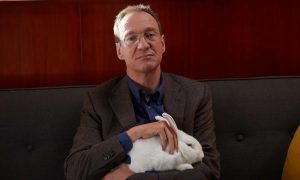
David Thewlis in GUEST OF HONOUR
HtN: Interesting. So, speaking further of casting, I was struck by the fact that the animal in the family is a bunny rabbit, and you could have picked any animal. Why a rabbit?
AE: I’ve had rabbits from a very young age. My rabbits have won at pet shows. Those are my ribbons.
HtN: So, that was your rabbit, Benjamin Bunny?
AE: I had the two rabbits. One was Benjamin, the other Carlos. I had rabbits before that. One was called Tiki. One was called Lady. I’ve always had Rabbits. I love rabbits, and I’m a little obsessed with them. Actually if you came to my studio, there are a lot of rabbit dolls. People tend to give me rabbit things as gifts. So, the mythology of the rabbit is something that’s pretty important to me.
It might be a little odd for most people, but one of the most, I would say, memorable moments in any film was in Michael Moore’s first documentary where they go into a place and it said, “Rabbits, pets or meat?” I think that an important thing about rabbits is that they have this dual function in the way that we don’t tend to eat other pets. People feel relatively comfortable with the idea of eating rabbit meat. So there’s this dual world they seem to inhabit in our imagination, and obviously that comes up in the film in ways that are unexpected, I suppose.
Also, because of this notion of how the rabbit links father and daughter, they can live unusually long and that becomes part of the narrative as well. People don’t expect that. So I’m realizing that yes, my obsession with rabbits maybe governs a lot of the … it is a personal film after all.
HtN: But I like it because it does make it slightly different. I think rabbits are adorable, I’ve just never had a rabbit. I do, however, have a beagle who loves to chase rabbits. Not that she has ever caught one nor will she…
AE: Well, the thing about rabbits is also that, unlike cats or dogs, you can’t really project a lot into them. They are what they are. They don’t have a lot of personality that’s discernible, so they’re a blank canvas.
HtN: Right. Well the bunny, whether it was one or two playing the part of Benjamin, was quite sweet.
AE: That was 45 rabbits. (laughs)
HtN: (laughs) 45 rabbits? Well, how would I know, right?
AE: Perhaps I exaggerate. (laughs)
HtN: I almost forgot to ask about Luke Wilson and casting an actor, who has this major Hollywood presence, in such a small role. How did you land on him as the priest?
AE: Because his agent really loved the script, suggested him, sent me a feature he’d done called Meadowland, by Reed Morano, which I had not seen, and I just thought he was wonderful. I’d only seen him in comedic roles. I just felt he had the right feeling and warmth. And again, he plays someone who’s transplanted. He’s clearly from Texas, and he’s part of this stew, if you will, of various identities that are floating through the film. He makes mention of that. I think there’s this one moment where I just think he was so wonderful when he’s able to say, when Laysla asks, “Why didn’t my father tell me about this?”, and he responds, “Because you wouldn’t have believed him.” That to me is so…there’s a level of judgment, but also compassion that he’s able to bring to that. And it was a joy to work with him.
HtN: So, I really like at the end how you do a fadeout in a mirror leaving one side of that equation vanished, and the other remaining. How did you come up with that visual device?
AE: That was inspired by that location, and a feeling that it was possible to do that there. I’m not sure if it was something that, if I had written it, would’ve felt heavy handed. But it suddenly felt very fluid in terms of this shot. It’s his last inspection. He leaves his tools behind. He’s about to leave the restaurant, and it really is the last time we see him alive, so it felt like a very interesting way to transition to death.
Mirrors have a huge place in notions of death, whether or not they’re covered during, like in the Jewish faith, or there’s this notion that there’s this other world. So it just felt like a way of representing how the body leaves, but something stays behind. And it felt subtle enough to use it. It’s one of those things that I don’t know if it would have read in the script the same way, but I love that moment in filmmaking. It’s one of the sheer joys of working with these independent projects that I can react to locations, and I can respond to things and not need levels of approval. I just go with my gut.
I think what’s incredible about cinema is that you can feel that decision of being taken because it’s quite fresh, as opposed to something which is set up and labored over. The camera’s able to transmit the spontaneity of that decision. In the same way that, of course in a close-up, there are decisions that an actor makes, and the camera is able to render that and give it to you, as with the speech you mentioned that David makes at the end. There are so many subtleties and things that he’s coming up with that are just spontaneous but are incredibly invested. So, moments like this where you see a relationship to location, something is happening with the choreography that allows you to play with that idea because obviously it’s something that you’re then playing with in post.
HtN: Well, I really enjoyed the film and it’s a pleasure to meet you and talk to you. Thank you.
AE: Thank you. Thank you so much.
– Christopher Llewellyn Reed (@ChrisReedFilm)
Like what you see here on Hammer to Nail? Why not pay just $1.00 per month via Patreon to help keep us going?









